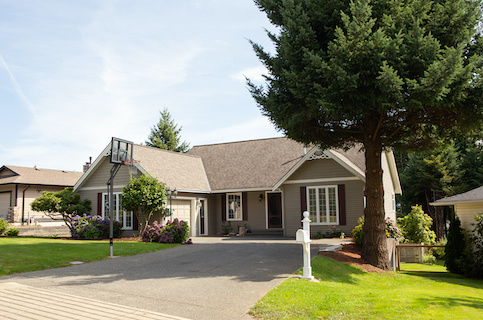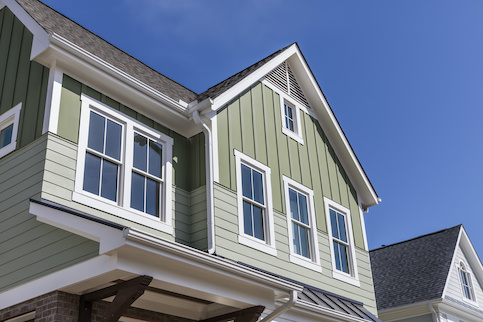If you have a 30-year mortgage and you’re looking at refinance options, you may be wondering if you should refinance to a 15-year mortgage. While there may be some benefits of refinancing to a 15-year fixed loan, there may be some drawbacks, too.
Let’s take a look at what it means to refinance to a 15-year mortgage and how it will affect your monthly budget.
Key Takeaways:
- Refinancing to a 15-year mortgage could save you money on interest but raise your monthly payments.
- Before you refinance, make sure you can afford your new loan payments and that you understand the costs involved.
- If you don’t want to commit to larger payments, you could make extra payments on a 30-year loan instead.
How Will A Refinance To A 15-Year Mortgage Affect My Monthly Mortgage Payment?
When you go from a 30-year mortgage to a 15-year mortgage, your monthly payments increase.
The best way to figure out if you can afford your new payments is to run the numbers with our refinance calculator. Compare your current mortgage payment to the calculator results to see if a refinance makes sense and fits into your budget.
Compare Refinance Offers From Verified Lenders:
What Are The Benefits Of Refinancing To A 15-Year Mortgage?
Refinancing replaces your old mortgage with a new one that comes with different terms. Those new terms could include a different interest rate or repayment schedule. Your new mortgage pays off the old one and still uses your home as collateral.
Let’s take a look at a few reasons people might choose a 15-year mortgage when they refinance.
Pay Off Your Mortgage Faster
When you refinance from a longer-term loan to a shorter-term one – say, a 30-year mortgage to a 15-year mortgage – you reduce the amount of time it takes to pay off the loan. If you can’t stand being in debt in general, or you’re trying to pay off your mortgage quickly so you can retire early, a 15-year mortgage refinance could help make that possible.
You may have chosen a 30-year fixed-rate mortgage when you bought your home because you couldn’t afford a larger monthly payment. Perhaps since then your income has increased, and you now feel you can comfortably afford to spend more on your home each month. If you refinance to a 15-year mortgage, you can shave years off your payments and get out of debt faster.
Save Thousands Of Dollars
In addition to getting out of debt sooner by repaying your mortgage faster, you could also save thousands of dollars in interest charges over the life of the loan.
Let’s say you owe $200,000 on your mortgage now and have an interest rate of 7.5%. You’re able to lower your interest rate to 6.5%, so you decide it makes sense to refinance.
If you refinance to another 30-year mortgage, you’re looking at a monthly payment of $1,264 and spending $255,089 in interest over the life of your loan. On the other hand, if you refinance to a 15-year mortgage at 6.5%, you’re taking on a monthly payment of $1,742, which is quite a bit higher. But the total interest you’ll pay over the life of your loan is $113,599. In this example, a 15-year mortgage saves you $141,490.
Now you’ll notice that for this example, we kept the interest rate the same for both loans for simplicity’s sake. But typically the interest rate you’ll get on a 15-year loan will be lower than what you’re offered for a 30-year loan, whether you’re signing an original purchase mortgage or refinancing. That, coupled with the shorter repayment period, results in even greater savings.
Move Out Of An ARM
If you purchased your home with an adjustable rate mortgage (ARM), you may be nearing the end of your introductory period. If so, refinancing could mean avoiding an adjustment that could make your loan much more expensive.
In this situation, you have two choices. You can refinance to a new ARM, or you can lock in a fixed interest rate for more long-term predictability. With a 15-year mortgage, you’re likely to score a lower interest rate on your refinance than with a longer loan term.
What’s Your Goal?
Buy A Home
Discover mortgage options that fit your unique financial needs.

Refinance
Refinance your mortgage to have more money for what matters.
Tap Into Equity
Use your home’s equity and unlock cash to achieve your goals.
Costs Of Refinancing To A 15-Year Mortgage
As with any loan, a refinance to a 15-year mortgage comes with certain fees, including:
- Application fees
- Credit report fees
- Appraisal fees
- Recording fees
- Title search and insurance
While the costs will vary depending on your loan and lender, you can expect to pay about 2% – 6% of your loan balance. For example, if you refinance a $200,000 loan, you can expect your closing costs to be around $4,000 – $12,000.
If you’re wondering, “Should I refinance my mortgage?” ask yourself how long you intend to stay in your home, and how much monthly savings you’re getting. Then make sure the numbers line up.
If refinancing saves you $200 a month but your closing costs are $4,000, it’ll take you 20 months to break even. If you think you might move after 12 months, refinancing won’t make sense. But if you’re certain you want to be in your home for another 10 years, then refinancing could result in huge savings over time.
Ready to Refinance?
Get matched with a lender that can help you reach your financial goals.
How To Decide If Refinancing To A 15-Year Mortgage Is Right For You
Whether refinancing to a 15-year mortgage makes sense for you depends on your situation. Take these steps to see if it’s right for you.
Compare Interest Rates
If you’re looking to lower your loan’s interest rate, make sure you compare your current interest rate with the new one you’ll potentially receive with a refinance. A 15-year mortgage will generally have a lower interest rate than a 30-year mortgage, because you’re paying off your balance twice as fast.
Calculate Long-Term Savings
If your main goal is to pay less interest over the life of your loan, switching to a 15-year mortgage may be the right option. How much you’ll actually save, though, depends on the interest rate available when you refinance and how many years you’re shaving off your repayment term. Use a mortgage calculator to estimate your savings.
Review Your Monthly Budget
Refinancing from a 30-year mortgage to a 15-year mortgage will usually mean taking on larger monthly payments. If your income has gone up since you signed your mortgage and you can afford the larger payments, this may not be a burden. But before you commit, review all of your monthly expenses to make sure those higher payments will be affordable, and that they won’t leave you with almost no room for discretionary or fun spending.
View Your Refinancing Options
Find a refinance lender that will work with your unique situation.
Refinancing To A 15-Year Mortgage Vs. Paying Off a 30-Year Mortgage Early
Your goal in refinancing to a 15-year mortgage may be to pay off your home sooner. But remember, you can always pay off a 30-year mortgage early. And that way, you won’t be obligated to make larger payments each month.
As a homeowner, you never know what surprise expenses you might encounter. Sticking with a 30-year mortgage that has lower monthly payments gives you more flexibility in your budget and could make it easier to manage unplanned repairs or other hiccups that arise in life. If you refinance to a 15-year mortgage, you’re committed to making larger payments.
FAQs On Refinancing To A 15-Year Mortgage
One question to ask yourself is what your credit score looks like now. The higher it is, the more competitive an interest rate you’re likely to qualify for on a refinance. If your credit score needs work, you may want to spend a few months trying to boost it before applying to refinance your mortgage.
The Bottom Line On Refinancing To A 15-Year Mortgage
Whether refinancing to a 15-year mortgage is a good idea depends on you. Think about your debt repayment goals, income and spending needs to decide whether you should refinance to a 15-year loan, refinance to a 30-year loan, or even stick with your current mortgage for the time being.

Ben Shapiro
Ben Shapiro is an award-winning financial analyst with nearly a decade of experience working in corporate finance in big banks, small-to-medium-size businesses, and mortgage finance. His expertise includes strategic application of macroeconomic analysis, financial data analysis, financial forecasting and strategic scenario planning. For the past four years, he has focused on the mortgage industry, applying economics to forecasting and strategic decision-making at Quicken Loans. Ben earned a bachelor’s degree in business with a minor in economics from California State University, Northridge, graduating cum laude and with honors. He also served as an officer in an allied military for five years, responsible for the welfare of 300 soldiers and eight direct reports before age 25.












